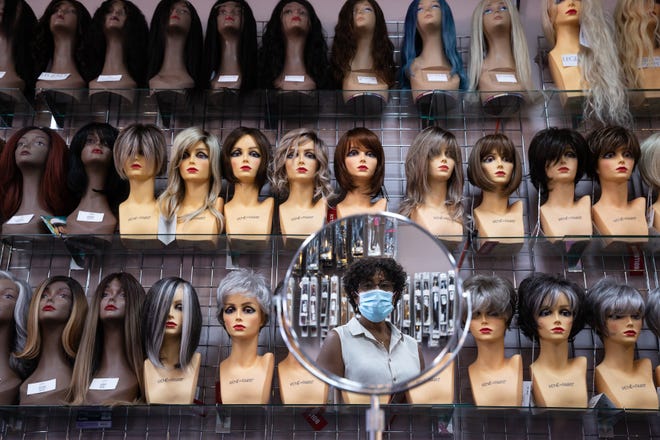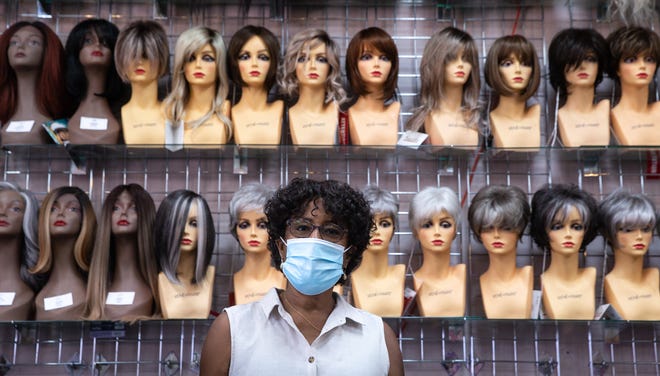PHOENIX — Since opening in 2003, Sunny’s Hair and Wigs in Mesa, Arizona, has developed a diverse clientele that includes many people who have lost their hair while undergoing chemotherapy battling cancer.
Owner Lisa Memberr’s customers are made up of different racial and ethnic backgrounds, represented by the black, brown and white skin tones of the mannequins in her store that display wigs that range from blond to black.
“My customer base is very diverse. I not only have Caucasians, I have African-Americans, I have Asians, I have Latino Americans,” Memberr said.
So Memberr, who is African-American, was surprised when her store recently was targeted by the 23-year-old founder of an anti-mask group. Ethan Schmidt travels around the Phoenix area confronting businesses that still require customers to wear masks to help prevent the spread of COVID-19 and claims he is the victim of discrimination.
In a video recording Schmidt posted on his Instagram page, Schmidt is seen repeatedly refusing the store manager’s request to put on a mask even after being told the store’s mask requirement is to protect customers undergoing chemo treatment from COVID-19.
Latest COVID-19 updates:Coronavirus lab leak theory ‘plausible,’ report says; new cases in states continue to fall
Instead of complying, Schmidt tells the store manager he does not wear masks because he has a “medical and religious exemption” and threatens to ruin the store’s business by posting the store’s name, phone, number and address on the internet.
“OK, well, you guys are going to get blasted all over the internet. You are going to be getting a bunch of calls here soon,” Schmidt says in the video, which he later posted on Instagram.
Since Schmidt posted the video, which has been viewed more than 600 times, Sunny’s Hair and Wigs has received numerous harassing phone calls, including some calls laced with expletives and bigoted language. Memberr reported the calls to the police.

“This is America. Fight for your freedom or we will shut down your f****** business. We are not Muslims. You don’t make people wear face masks,” a female caller says in one voicemail Memberr shared with The Arizona Republic, which like USA TODAY is a part of the USA TODAY Network.
A different caller tells a store employee he called from Massachusetts after watching Schmidt’s video and sharing it “with everyone I know.”
“I’m a citizen calling on the behalf of a video I saw of you violating another fellow citizen’s medical, religious and constitutional rights,” the caller says.
When the store employee asks the caller what religious rights he is referring to, the caller says “Christianity.” The employee responds, “I’m a Christian.”
“Well maybe you shouldn’t be violating … the Civil Rights Act of 1964,” the caller says.
In an interview, Schmidt said he believes the store discriminated against his religion and medical condition. He said he is a Christian. He declined to disclose his medical condition.
Schmidt said he is the founder of the Anti-maskers Club, one of numerous groups that have popped up on the internet. Schmidt said he has posted “hundreds” of videos of himself doing the same thing at other businesses.
“People need to respect my constitutional rights, my freedom of religion,” Schmidt said. “This is new territory and it’s called mass discrimination. It’s no different than saying, ‘Oh, you’re Black, you can’t come in my store.'”
The harassment against Sunny’s Hair and Wigs shows how some businesses in Arizona and across the country that continue to require masks are being targeted by people claiming that COVID-19 mask requirements violate their civil rights.
But legal experts say that argument does not hold water.
“This argument that the Civil Rights Act of 1964 means that individuals have a religious or medical exemption to business mask mandates is specious. It is fully specious,” said Jennifer Piatt, a research scholar at Arizona State University’s Center for Public Health Law and Policy, and a senior attorney with the Network for Public Health Law’s Western Region Office.
Businesses that continue to require customers to wear masks have become easier targets for anti-mask groups as more businesses ease off mask requirements following the lifting of local mask mandates.
“If a large portion of businesses are not requiring masks and some smaller portions of businesses are requiring masks, I could see how that might provide a little bit of exposure for these businesses to those kinds of actions,” Piatt said.
The Civil Rights Act of 1964 prohibits discrimination on the basis of race, color, religion, sex, national origin, sexual orientation and gender identity.
Opponents of business mask requirements seem to be conflating provisions from two different sections of the law to make their argument, Piatt said.
Title 2 of the act prohibits discrimination on the basis of religion, race, national origin and other protected classes in “places of accommodation” such as movie theaters, hotels, restaurants and other businesses, Piatt said.
“So you could not put a sign out saying no person of this religion is allowed,” Piatt said. “That is fully barred by Title 2.”
But that is not what is happening when businesses require customers to wear masks to help prevent the spread of COVID-19, Piatt said.
“Businesses are instituting a neutral and generally applicable requirement that applies to everybody who is seeking a service at this place of business,” Piatt said. “They are not doing anything discriminatory. They are not discriminating against anybody on the basis of religion.”
Title 7 of the Civil Rights Act, meanwhile, prohibits employment discrimination on the basis of religion, race, national origin and other protected classes, Piatt said.
That section also states that reasonable accommodations must be provided to people with different religious beliefs, Piatt said.
What anti-mask groups are doing is “cherry picking” the provision from Title 7 that states that reasonable accommodations must be provided to people of different religious beliefs and wrongly applying it to Title 2, Piatt said.
“That argument doesn’t hold water because what businesses are doing is simply applying a neutral general requirement that they apply to everybody who comes to the business,” Piatt said.
On March 25, Gov. Doug Ducey signed an executive order that essentially allows businesses to no longer follow mask mandates that require customers to wear masks to help prevent the spread of COVID-19. The order, however, gives businesses the option to continue to require customers to wear masks and also to refuse service to people who refuse to comply with their policies.
On May 13, the Centers for Disease Control and Prevention issued new guidelines saying fully vaccinated people can stop wearing masks in most indoor settings, unless businesses require them.
Following the CDC mask guidance, Mesa revised its policy on May 24, making mask wearing optional at all city-owned public buildings.
As mask mandates have eased, many businesses have stopped requiring customers to wear masks. Under Ducey’s order, businesses have the right to set their own mask policies and some businesses have kept store mask requirements in place, including Sunny’s Hair and Wigs.
Memberr, the owner of the store, said she kept the policy in place because a significant number of her customers who come to buy wigs have lost hair while undergoing chemotherapy for breast cancer.
“A sign on our door explains that we have customers whose health is compromised and we try and provide a healthy environment for them,” Memberr said.
Some businesses have chosen to keep mask requirements in place because studies show that people who don’t wear masks can pass the virus to people whose immune systems are compromised, such as people undergoing cancer treatment, or who may be unvaccinated for other reasons, said Julia Raifman, an assistant professor of health law, policy and management at Boston University’s School of Public Health.
Studies have shown that vaccines against COVID-19 are less effective for people who are immunocompromised, Raifman said.
Raifman oversees a database project that tracks policies states have implemented in response to the pandemic.
“I absolutely think federal and state policies play a really important role in shaping attitudes towards policies,” Raifman said. “We see a lot of anecdotal evidence that businesses and employees don’t feel supported in making the decisions that are healthiest for them personally or for their communities without federal guidance and without state guidance on masks.”
Meanwhile, Memberr is trying to cope with harassment her business continues to receive from the video posted on Anti-masker Club page on Instagram.
“We began receiving phone calls from his followers, threatening to shut down the store, using very abusive and offensive language,” Memberr said. “They kept insisting that they were going to shut down my business and not in such nice terms.”
Memberr said the harassing phone calls have taken a toll on her and her staff. Her manager has had trouble sleeping and an employee who was personally insulted on one of the calls was so upset she started crying. Memberr herself postponed a trip to visit relatives because she did not want to leave her staff to deal with the harassment on their own.
“Emotionally, and even psychologically, it has really placed a heavy load and a burden on us unnecessarily,” Memberr said. “There needs to be a stop to this and it is unfortunate that it has been allowed to reach this level.”
Follow Daniel Gonzalez on Twitter: @azdangonzalez.



















